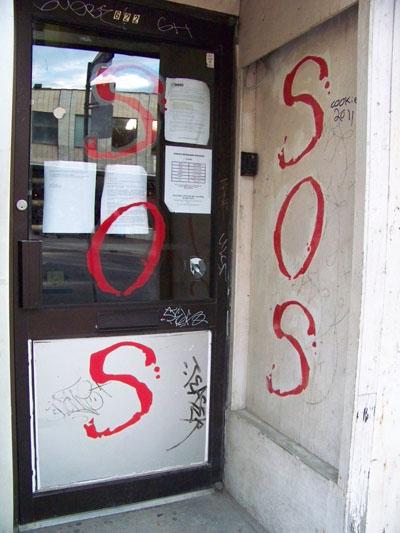After almost 26 years as the only community service for youth engaged in the sex trade, Street Outreach Services (SOS) closed it doors on Aug 31.
“We were the first to do outreach, we were the first to engage with LGBTQ youth, we were the first to deal with issues of street-based sex trade,” says Robbyn Zwaigenbaum, a former SOS case manager who is now without a job.
“I’m speaking as an individual, not on behalf of the organization,” Zwaigenbaum says.
Working exclusively with youth, ages 16 to 24, who were at risk or fully engaged in the sex trade, SOS offered outreach six nights a week, in-house counselling, HIV and harm-reduction education, job skills training, and assistance with schooling, housing and different types of out-of-office appointments.
“I’ve been the mediator in between to make sure that all of my clients’ worries and concerns were voiced if they weren’t comfortable enough to do it themselves,” says Zwaigenbaum. “I’ve been to countless doctors appointments with clients.”
The hammer came down May 27, 2011 in a letter from Heather McDonald, director of youth services for LOFT Community Services, which oversaw SOS:
“Over the past year SOS has taken a detailed review of its services. The review showed how much the times have changed since the founding of SOS. With the advent of cellphones and the internet there is a significant decrease in street prostitution by youth, there are also now many LGBTQ services, there has been an increase in services for homeless youth, and there are a number of other youth-serving agencies providing services to the same kinds of youth served by SOS.”
Yes and no.
Cellphones and the internet have changed how the sex trade is run, but there are still many youth sex workers working the streets. And although there are several agencies in Toronto that work with queer and homeless youth, they are not focused on youth engaged in sex work.
“SOS is the only one that is a youth organization specifically for sex-trade workers. The other youth organizations are predominantly faith-based and are abstinence-based. Youth have disclosed previously that they didn’t feel safe in those areas. They are not in a position to disclose that they are in the sex trade. They feel shame because of it. They can’t get harm reduction,” says Zwaigenbaum.
There was a $40,000 budget set aside for an ad campaign to attract more clients that was never used. Zwaigenbaum wonders why it wasn’t used if LOFT really wanted to attract more clients.
SOS was also the only community service that worked specifically with young men in the sex trade; other sex-trade organizations in Toronto are exclusively for women. More than 60 percent of SOS clients are young men in their late teens, many working in the Village.
Solomon Christiansen, founder of the Saving SOS Facebook group, says, SOS “has gotten me out of escorting by helping me build up my self-worth. When I accomplished something they did not take credit for it; they told me, ‘You did it.’ They are so personal with their clients, and it feels like they are your best friends. You can tell them anything and they will not judge you for anything; they treat you like a person, not as a number.”
Initiatives such as handing out condoms, crack and needle kits, water and emotional support in the downtown core while on foot, rather than from vans like other outreach services, earned SOS much trust from their clients. During a very dangerous period in 2010 in which street sex workers were beaten and robbed, SOS was able to coordinate meetings in safe spots through their community outreach phone.
“There are so many clients that use SOS as a safety net when life gets tough; we have someplace to feel safe and comfortable and be around others that have been through similar experiences,” Christiansen says.
A major concern is where the many young trans women in the sex trade will go.
“Politically, the majority of women’s organizations mandate that trans women are welcome. Many of those organizations deal with sex-work specific spaces, which is great. However, it’s one thing to have it on paper and it’s another to actively access those services. A number of my clients who identify as trans women have felt that they weren’t welcome or safe in these spaces,” says Zwaigenbaum.
“A sad sad day when SOS closes. So many young men and women helped by this agency over the years,” wrote Devorah Ticha on the Street Outreach Services Facebook page.
“They are terrified. There’s a huge abandonment issue here,” says Zwaigenbaum of her clients. “A lot of them are not taking it well.”
An open house/farewell was held on Aug 30, at which current clients and clients from as many as 20 years ago paid their respects and give thanks.
“There are no other services like SOS. Thus, nothing will ever fill the gap that is going to be created when SOS closes its doors for good. It was so important to me because I felt safe, cared for, and I felt like a person,” says Christiansen.

 Why you can trust Xtra
Why you can trust Xtra


